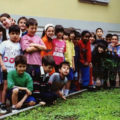Today is the last day of school (in Lombardia). Making the local headlines yesterday was a 14-year-old girl who threw herself off a bridge, because she knew she would fail her first year of high school. Her reaction is both extreme and unusual, because failing one or more years of high school – any high school – is common in Italy, and doesn’t carry much stigma. Ross estimates that 8 or 9 of her class of 28 (including herself) are likely to flunk.
Some likely reasons for this high failure rate (or mortalita’ scolastica – “school mortality,” as it’s called) include:
- Overloaded curriculum (set by the government). The “experimental” curriculum at the liceo artistico requires 19 periods a week of academic classes (9 different subjects) and 19 periods of studio art (3 subjects). There’s simply too much to cover in a year, especially when most subjects get only two periods a week, and students are expected to absorb material, for example in biology, that I did not learn until college! Even the best teachers can’t get through it all, as they tacitly admit by giving occasional extra classes after school.
- Teacher competence (lack of). The government requirement for teachers to have a specific teaching qualification (and not just a degree in the subject they are teaching) is fairly recent, so there are many teachers in the system who have never had formal training in how to teach. Some are good teachers by reason of natural aptitude and/or profitable experience, but many are not. And I’ll leave that topic before I start foaming at the mouth.
Between a heavy curriculum and often-incompetent teachers, students are left to make their own way through reams of material covered badly, if at all, in class. Sometimes they are even expected to study and understand a new topic on their own, before any mention is made of it in class. The lucky ones have parents who can help them, and/or can afford to pay outside tutors for help in one or more subjects. These tutors are usually teachers themselves, either just starting out (and lacking, as yet, a permanent position), or retired, or teaching at other schools. I am tempted to wonder whether the problems outlined above are wilfully ignored because they provide extra income (tax-free, under the table) for otherwise underemployed and underpaid teachers.
Even for the kids bright enough to get through it all on their own, 34 hours a week in the classroom, plus homework, is a lot of studying. And it’s exhausting for parents to come home from their own jobs and then have to spend an hour or two getting their heads around academic subjects they haven’t touched in years, in order to help their children with homework.
No wonder we’re all completely burned out. Today’s the last day of school. All the kids will be doing something to celebrate the end of a gruelling year, whether they passed or not. We parents deserve a pat on the back as well, for all OUR hard work. In fact, we deserve a party. But I’m too tired to organize one right now.
Results
Jul 5, 2004
Ross did manage to pass her first year of high school, with three “academic debits.” This means that she has lots of homework to do over the summer, and by early September must be ready to prove to her teachers that she has done it. She’s very busy at theatre camp in the US for six weeks now, so August is going to be a hell of homework and nagging for all of us…
next: private school




Excellent observations. I did an “experimental School” and you have nailed all the issues. Well Done!